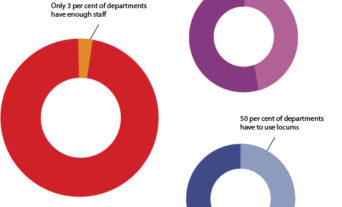Genomic analysis in cancer patients
In recent years, the word ‘genomics’ (understanding the genome) has been at the forefront of advancements in healthcare science. Its growing role is clear in many steps of the patient pathway, from diagnosis, through tailored treatment strategies, to screening at-risk family members. While the concept of personalised medicine is not a new idea, advances in genomic technologies, such as whole genome sequencing, are expanding the use of genomic data to influence treatment decisions across a growing list of clinical specialties.
Genomic analysis of both germline (usually a blood or saliva sample) and somatic variation (detected by looking at the tumour DNA) in cancer patients can contribute to accurate cancer diagnosis and tailored treatment and management plans, as well as helping to identify the risk to other family members.
In the world of cancer diagnostics, investigating changes (variants) in a patient’s germline DNA can help identify inherited changes that can lead to cancer and pose a risk to other family members. The majority of cancer patients, however, do not have a heritable DNA variant but have, instead, acquired the genetic change that causes their cancer during their lifetime. Such variants are described as somatic and usually start with damage to a single cell, which spreads through cell division. But as the DNA variants are not, therefore, found in every cell in the body, they are not passed between generations.
Genomic analysis of both germline (usually a blood or saliva sample) and somatic variation (detected by looking at the tumour DNA) in cancer patients can contribute to accurate cancer diagnosis and tailored treatment and management plans, as well as helping to identify the risk to other family members.
Pharmacogenomics and gene testing
The NHS has a longstanding commitment to using advancements in genomics to improve patient care. This year has seen the launch of the National Genomic Test Directory1 in the NHS in England. One of the major developments of the Genomic Test Directory for cancer is the introduction of DPYD gene testing, a key example of the importance of pharmacogenomics in cancer treatment.
Pharmacogenomics, as the name suggests, merges the worlds of pharmacology with genomics. How patients respond to drugs, and which side effects they encounter, can in part be explained by their genome. Genomic testing in Genomic Laboratory Hubs is, therefore, expanding beyond searching for changes in DNA that might cause or drive a patient’s disease, to look at how a patient’s genome influences how their body breaks down drugs, moving us another step closer to truly personalised medicine.
The benefits of DPYD testing
Fluoropyrimidine drugs such as 5-fluorouracil (5-FU) are widely used as chemotherapeutic agents in the treatment of a variety of cancers. The dihydropyrimidine dehydrogenase (DPD) enzyme, which is encoded by the DPYD gene,2 plays a role in the breakdown of drugs such as 5-FU and is responsible for the elimination of over 80% of administered 5-FU.3
Patients with germline variants in the DPYD gene can have reduced or absent DPD enzyme activity. As a result, 5-FU is not cleared from the body as effectively as it should be, resulting in increased risk of toxic side effects.4–6 Adverse toxicity reactions in patients treated with fluoropyrimidines include vomiting, diarrhoea, breathlessness and severe skin reactions, and can in some cases be fatal.
DPYD gene variants
DNA variants can occur at any location within a gene. For DPYD , some variants (based on current knowledge), typically called polymorphisms, are very common in the general population and do not affect DPD activity in a clinically relevant way. There are, however, variants that do affect the function of the enzyme. Four, in particular, have been identified in the context of 5-FU toxicity to be of particular importance owing to how common they are in the general population and their well-established impact on enzyme function.
By testing for these important DPYD variants before starting treatment, clinicians can identify those patients at an increased risk of toxic side effects from these drugs and modify the dose accordingly or avoid their use altogether in high-risk patients.
These four variants are named (based on their position in the gene): c.1905+1G>A; c.1679T>G p.(Ile560Ser); c.2846A>T p.(Asp949Val); and c.1129-5923C>G. Taken together, approximately 7% of Europeans carry at least one of these four variants.7 By testing for these important DPYD variants before starting treatment, clinicians can identify those patients at an increased risk of toxic side effects from these drugs and modify the dose accordingly or avoid their use altogether in high-risk patients. This relatively simple genetic test can, therefore, reduce the risk of significant or even fatal toxicity in patients with these DPYD variants.
Testing for DPYD variants is not a new idea and has previously been available in some Trusts, as well as for some patients recruited to the 100,000 Genomes Project.8 In 2020, however, its importance was highlighted by the European Medicines Agency, who specified the four named DPYD variants associated with DPD deficiency in the product licensing, with a recommendation in March 2020 from their Pharmacovigilance Risk Assessment Committee that this testing should occur prior to commencing fluoropyrimidine chemotherapy.9
New testing strategy
Under the new test directory, DPYD testing will be performed by the seven Genomic Laboratory Hubs of the NHS Genomic Medicine Service. Tests can be performed on a simple blood sample and only need to be performed once prior to the first fluoropyrimidine treatment.
This new DPYD testing strategy will, therefore, increase accessibility to this important test for cancer patients and lead to more personalised treatment approaches, reducing the risk of severe side effects and, in some cases, save lives.
The new Test Directory allows all eligible cancer patients across England to have access to this test, regardless of postcode. In England alone, approximately 38,000 patients are started on fluoropyrimidine-based chemotherapy each year.10 This new DPYD testing strategy will, therefore, increase accessibility to this important test for cancer patients and lead to more personalised treatment approaches, reducing the risk of severe side effects and, in some cases, save lives.
The challenges and future of DPYD testing
Drug metabolism is complex and the presence of a high-risk DPD variant may not be totally predictive of high toxicity. Although the presence of a clinically relevant DPYD variant may indicate that a reduced dose should be used initially, guidelines also suggest increasing the dose in patients who show no clinical evidence of toxicity to try to maximise efficacy of the treatment. It’s about ensuring a balance between the effectiveness of the chemotherapy in treating the cancer and the toxic effects on the patient.
Equally, patients who proceed with fluoropyrimidine treatment, and for whom none of the four currently tested DPYD variants are detected, may still experience toxicity due to other genetic, clinical or environmental factors. In short, genomics is only one piece of a very complex puzzle.
Importantly, much of the current knowledge of DPYD variants in fluoropyrimidine toxicity has been derived from studies of largely Caucasian populations. The prevalence and clinical impact of DPYD variants is known to vary between different ethnic groups,7,11 but further evidence is required to fully appreciate the frequency and clinical associations.7
Limits of current knowledge
Fundamentally, current testing strategies can only be based on current knowledge and understanding. It is crucial that the most up-to-date dosing guidance is used when interpreting DPYD variants.
The strategy to test for the four aforementioned variants is based on systematic review and published guidance by the Clinical Pharmacogenetics Implementation Consortium (CPIC)7 and the Dutch Pharmacogenomics Working group,12 whose guidelines relate to DPYD variants where there is robust evidence for the association between DPYD variants and fluoropyrimidine toxicity.
Testing for these four variants together is estimated to predict 20–30% of early onset, lifethreatening 5-FU toxicities.7,13 While many other variants have been identified in the DPYD gene, evidence for the effect of these variants on DPD function is, typically, either insufficient or conflicting.7
Our scientific knowledge is increasing all the time. Thus, in the future, more clinically relevant variants in DPYD or other genes may be identified that might further influence treatment decisions.
Some testing strategies may identify additional variants in the DPYD gene, for which the clinical consequence may be uncertain. Reporting of uncertain findings has always been (and will continue to be) an ethical challenge for genetic laboratories. For DPYD, the decision to report such findings is a struggle between causing confusion and anxiety, when reporting something where clear clinical dosing guidance is not available, versus withholding what might (or might not) in future be useful clinical information.
Our scientific knowledge is increasing all the time. Thus, in the future, more clinically relevant variants in DPYD or other genes may be identified that might further influence treatment decisions. Testing laboratories and clinicians have a huge responsibility to ensure, when possible, that tests are informed by the most up-to-date knowledge, and that the most recent dosing guidelines are being followed.
Only the beginning
In summary, the introduction of DPYD testing to the National Test Directory in the NHS in England has propelled the Genomic Medicine Service into the exciting world of pharmacogenomics. This crucial step in the patient pathway fully embeds genomics into routine cancer care. This allows clinicians to personalise treatment decisions based not only on the DNA variation causing or driving their disease, but also by looking at how their body metabolises drugs.
With advancements in genomic technology, and our continually expanding knowledge of the role of genomics in drug metabolism, the clinical utility of more and more gene–drug pairs is inevitable. DPYD is only the beginning.




